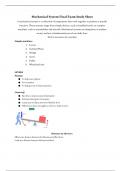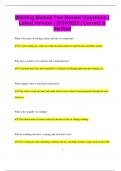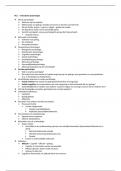1. What is Law?
Enforceable rules of conduct that structure civil society. Imposed by the public authority.
Rules of law vs rule of behavior.
2. Distinction
Mandatory rules of law vs default rules.
Mandatory: applies to everyone and you cannot disagree with it. (e.g. traffic rules)
Default: default rules in contracts (wills, rent agreements etc.) which are open to modification by
both parties involved in the contract. They are negotiable.
Mandatory protective rules vs public policy rules (both examples of mandatory rules).
Public policy rules: Ties the society together by social, moral and economic values. It changes
from culture to culture and from time to time.
= mandatory rules that underpin the operation of legal systems in every state (mock trial)
(E.g. minimum wages in a state, social taxes, OCMW (social center for public welfare) and
other public assistance programs)
Mandatory protective rules: Rules that aim to protect the “weaker economic party” of a contract.
(E.g. refund&return policy in the EU includes a mandatory period of 14 days for the customer to
ask for a refund or return.)
3. Sources of Law
Legislation: The act of making laws. Examples include treaties, constitution, acts,
presidential/royal decrees, regulations
Jurisprudence (case law): Interpretation and application of a general rule of law by a judge or
a court of law on an individual situation. A judge interpreting a law or precedence (past case
rulings). Only binding for litigating parties.
Legal Doctrine: Department that evaluates exposition of the substance of private law, criminal
law, public law, etc.
→ picks up questions from legal practice and discusses them (mock trial)
Customary Law: Customs and behaviors that a society has.
Customary law, in its simplest form, is a body of rules, unofficial and generally unwritten,
established through cultural or societal norms. When a society considers certain behaviors or
practices so common as to be required by law, whether officially recorded or not, those beliefs
establish the basis for customary law. (e.g. islamic cultures have their own rules)
, 4. Legal systems
Civil law systems: Derived and evolved from Roman law, a comprehensive system of rules
and principles usually arranged in codes and easily accessible to citizens and jurists. Laws are
struck in writing and codified. (60% of the world)
Common law systems: The final decision is made by the interpretations of the jury or judges.
While the term common law is used to refer to principles applied to court decisions, a common
law system refers to a legal system that places great weight on judicial decisions made in prior
similar cases.
Religious law system: Based on the rules of a specific religion, State and religion are linked in
laws. (E.g. Islamic law based on what the Koran says)
5. Branches of law
Public law: Law concerning the relationship between individuals and government/ authorities.
- Constitutional Law
- Administrative Law
- Tax Law
- Criminal Law
- Procedural Law
Private law: Law concerning the relationship between individuals or businesses that does not
directly concern the society.
- Civil law
- Commercial law (business law)
, Chapter 2A Universal Constitutional Law
1. Purpose of constitutional law
Constitutional law is a body of law and has 3 types of rules:
- defining the state (boundaries, anthem, flag, etc.)
- recognition of the rights of the citizens (e.g.: freedom of speech, religion, right to
counsel, right to abortion)
- attribution and limitation of power to state institutions (executive, legislature, judiciary)
2. The struggle for power
State power vs freedom
What is allowed to do? The authorities, rights and obligations an individual or
organization have.
3. State Institutions
Trias politica
In belgium:
- The federal legislature
makes the laws and
controls the executive. It is
exercised by the parliament and the king. The parliament consists of two chambers, the
Senate and the House of Representatives.
- The federal executive runs the country. It ensures that the laws are applied and
complied with in concrete cases. The executive power is exercised by the king and his
government of ministers and state secretaries.
- The judiciary rules on disputes and is exercised by courts and tribunals. It also
checks the legality of the acts of the executive.
4. The language of constitutional law
- State structure: The way power is distributed amongst the entities of the state:
Federation (e.g. Belgium and Brazil) vs Unitary State = all power belongs to a
central government (e.g. Italy and Japan)
- Government system: monarchy (king) vs republic (president)
(e.g. democracy (direct vs representative))
- Head of state: King vs president (exact power can differ)
- Legislature: an assembly with the authority to make laws for a political entity.
Mostly composed of two houses: The Senate and The House of Representatives
- Executive branch: An assembly with the authority to execute the laws.
(e.g. the government led by the prime minister)










